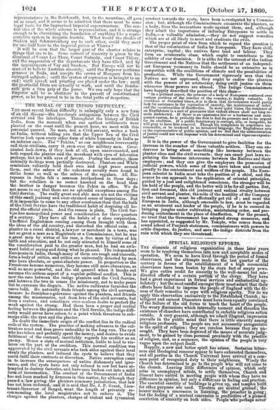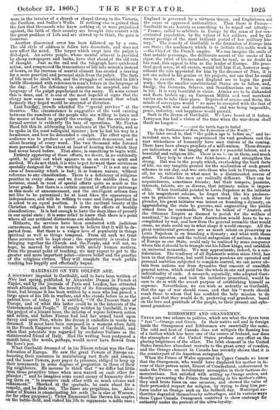SPECIAL RELIGIOUS EFFORTS.
Tire elements of religious organization in these later years seem to be resolving themselves into new and acceptable modes of operation. We seem to have lived through the period of formal observance, and the attempts 'made in the last quarter of the century in favour of the establishment of a high ceremonial observance have been beaten by the stern fact of empty pews. We give entire credit for sincerity te fihe well-meant but mis-
directed efforts of a certain portion the clergy. They have had a great experiment in formal 'services and ecclesiastical up- holstery ; but the most candid amongst them must admit that their efforts have failed to impress the people of England vvitia the fit- ness of their remedies to cope with religious apathy. 'Nei do we apply this observation exclusively to the Established %high ; in- telligent and earnest Dissenters must have been equally convinced of the failure of the old forms to touch the heart of the people. The weary discussions which internally torment and threaten the existence of churches have contributed to enfeeble religious action outside. A very general, although we admit illogical, impression prevails in the public mind that' there is little sincerity among religious professors. The people ire not necessarily antagonistic to the spirit of religion ; they are' became they are un- sought. They have been deprived 'it the means of accurate judg- ment, to be gained by close personal proximity with the practice of religion, and, as a sequence, the opinion of the people is very vague upon the subject itself. Happily, a new and better spirit has arisen. Sectarian bitter- ness and theological rancour appear to have exhausted themselves, and all parties in the Church. Universal have arrived at a com- mon point of recognized duty to their neighbours. Wisely the Church has determined to go to the people who will not come to the church. Leaving little differences of opiniot, which only arise ' in unemployed minds, to settle themselves, Church and Dissent have united in meeting people with whom they have no difference in opinion, but only a difference in feeling and practice. The essential sanctity of buildings is given up, and temples built. for other purposes are used. Theatres are neutral ground ; the hearer makes a concession in listening, the preacher in going; , but the feeling of a mutual concession is productive of a pleased conviction of sincerity on both sides. People who perhaps never were in the interior of a church or chapel throng to the Victoria, the Pavilion' and Seidler's Wells. If nothing else is gained than the fact that thousands who knew nothing of, or were prejudiced against, the faith of their oonntry are brought into contact with the great problem Of Life and are stirred up to think, the gain is immense.
Another discovered error has been followed up by a cure. The old, style of address is fallen into desuetude, and does not now affect the mind. The torpor which crept into the pulpit is dislodged. An active people, whose mental aliment is provided by cheap .r.owspapers .and books, have shot ahead of the old ruts of thought. Just as the rail and the telegraph have quickened adieu, and *impressed the transactions of life into minutes instead of hours, to the increase of mental aliment bas created a craving fora more practical and. personal etyle from the pulpit. The facts ef life must be _dealt with, and the struggles of mankind in life's battle illustrated with reference to man's filters in. the language of the ,day_.. ,Let, tie deficiency in. education he accepted, and the language of the_pulpit, popularised to the many. To some extent this is done, and, it is one of the most hopeful of signs that the clergy now emeir.tb reason upon and. recommend that which
formerly they hoped would be aecepted at dietation. -
Last Suriday, giiwds attended the "special Services" at the theatres. The cireumstance is suggestive of the void existing between the numbers of the people who are willing to listen and the means at hand to gratify the craving. But the entirely un- formal service is evidently the base Of operations. Mr. Paxton Hood felt this in addressing his audience at the Victoria, and so he spoke in the;taost colloquial manner ; how be lost his way to a farmhouse, and how he d,escended a eoalpit. The effect upon the audience was to produce a quiet and earnest demeanour, and a silent hearingiof every word.. The 'two, thousand.. who listened were persuaded to-the extent at least of bearing that which they had never heard. before. That alone' is something to begin with.
Entirely aRproving of these efforts, we desire, in no unfriendly spirit, to pouirAut what appears to us an error, in spirit and method. We elesintethink it is wise to put forward these services as specially designed for "the working dames." it is not any one class of humanity which is bad; it is human nature, without reference to anyelassification. There is a deficiency-of religious practice in every class and we fear that the middle olass, for instance stand in "need of special efforts quite as much as the lower grade. But theireis a certain amount of offensive patronage in this mode of announcement, and the intelligent artisan does not like to be patronized ; he at least likes the appearance of independence, and will be willing to come and listen provided he is asked to an equal position. It_ is the cardinal beauty of the Christian religion that it breaks down the effects of worldly classiticatiens. It is bad enough to have the deep lines of poverty in our social state ; it is some relief td know that there is a point where all our artificial distinctions are abolished.
Hitherto, the services have been conducted with judicious earnestness, and there is no reason to believe that it will be de- parted from. But there is a vulgar love of popularity in. things spiritual as well as `things temporal. Front all Ruch we trust these services will be kept-clear ; the opportunity is created. for bringing together the Church and the People, and will not, we hope,„ be marred. by admixture with merely human motives. From the present point of teaching, we mar expect to get to the greater and more important point—sincere 'belief and the practice of the religious virtues. They 'will complete the work public teaching has happily and effectually begun.



























 Previous page
Previous page